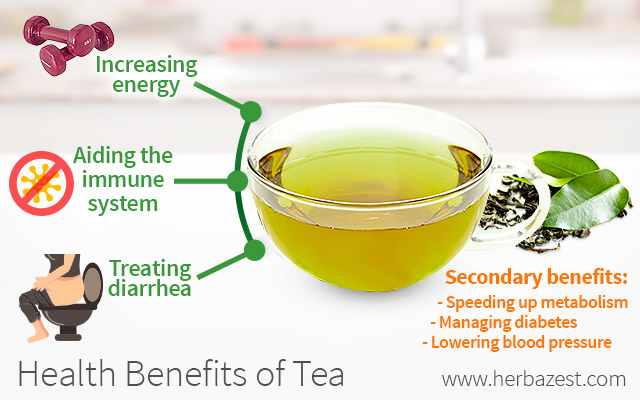Since its discovery in China, 5,000 years ago, drinking tea has become a priceless part of the morning routine around the world. It is not only comforting for the early risers, but it also provides mind alertness for a good day start. However, only recently has the scientific world started to validate the nutritional and medicinal tea benefits.
Main Benefits of Tea Plant
Although research about the health benefits of tea plant is still ongoing, certain properties have been scientifically proven to ward off degenerative diseases, making tea leaves a valuable addition to a healthy lifestyle.
Increasing energy
Tea leaves contain an amino acid called L-Theanine, which induces alpha brain activity, aiding relaxation. When this substance is combined with caffeine, a natural stimulant compound, it improves mental alertness and energy levels throughout the day.
The caffeine in tea has also been shown to improve athletic performance and endurance.
Scientific studies suggest that a regular consumption of tea increases memory, executive function, and information-processing speed. Interestingly, lower intakes of tea have shown to decrease cognitive abilities.
Aiding the immune system
Though they may vary in their chemical composition, all types of tea include roughly 30,000 compounds called polyphenols, to which many of the benefits of tea are attributed and which are particularly abundant in green and black tea.
During the process of digestion, a group of tea polyphenols called catechins enters the blood stream, and their great antioxidant action neutralizes free radicals, which are harmful molecules that can cause cellular damage and inflammation.
Additionally, tea leaves are packed with 28 mineral elements, such as selenium, fluorine, and potassium, which keep the body hydrated and nourished, thus contributing to a healthy immunity.
Treating diarrhea
This is a medicinal benefit of tea that has been well-known for ages. Both black and green tea have shown a strong antibacterial activity, which, aided by the astringent properties of tannins (another group of polyphenols), has proven effective in the treatment of diarrhea.
Secondary Benefits of Tea Plant
Speeding up metabolism
Although healthy tea alone does not have magical weight loss properties, when paired with a balanced diet and exercise, it can be a powerful tool in weight management. Although its exact mechanism of action is yet to be understood, various clinical studies have demonstrated that green tea extract speeds up the metabolism and helps burn fat.
This benefit of tea for dieters is thought to be due to the high content of catechins in tea leaves, which promotes fat oxidation and thermogenesis. There is a strong evidence that when green tea extract intake is complemented with regular exercise, the results of weight loss are greater. The caffeine that is naturally present in tea has also been commonly associated with fat burning.
Managing diabetes
The flavonoids in tea have also been reported to offer health benefits by aiding blood sugar regulation and preventing diabetes-related damages caused by oxidation.
Due to the intake of food or endocrine imbalances, the levels of glucose in the blood increase, stimulating the pancreas to release insulin in order to restore balance. Flavonoids make cells more sensitive to insulin, thus speeding up glucose metabolism and regulating blood sugar levels. It has also been proven that the consumption of green tea extracts for the minimum of two weeks could lower fasting blood glucose.
Lowering Blood Pressure
Tea antioxidants have been shown to repair the damage caused by the high amounts of low density lipoprotein (LDL), commonly known as 'bad' cholesterol. High levels of LDL accumulate on the arteries' walls, forming plaque and causing atherosclerosis, which results in a restricted blood flow and raises blood pressure. It is commonly known that high blood pressure along with high cholesterol increase the risk of cardiovascular disease.
It has been found that tea's polyphenols can lower LDL levels, thus preventing atherosclerosis and lowering the risk of a heart disease.
Sources
- Food Research International, Medicinal and therapeutic potentialities of tea (Camellia sinensis L.), 2016
- National Institutes of Health, Herbal Medicine: Biomolecular and Clinical Aspects
- Oregon State University, Micronutrient Information Center, Tea | Flavonoids
- Sociological Perspectives, The Effects of Caffeine on Health: The Benefits Outweigh the Risks, 2014




